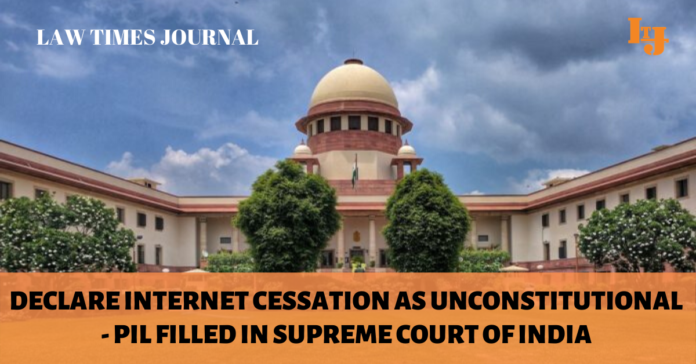
The Supreme Court of India on 10th January 2020 requested the Indian Central government to review the suspension of internet services in the state of Jammu and Kashmir, since August 5 2019, after the abrogation of Article 370 of the Indian constitution that provided special autonomy status to Jammu and Kashmir, access to mobile, landline and internet networks have been suspended. The government cited the protection of national security as a reason for the restrictions. In October 2019, certain services were partially restored, however, most of Kashmir has remained disconnected from the internet making it the longest network restrictions in a country that likes to describe itself at the ‘world’s largest democracy’.
In November 2019, the Jammu and Kashmir High Court disposed of a petition seeking restoration of prepaid mobile phone connectivity and internet services in Kashmir on the ground that similar petitions were pending before the Supreme Court.
The Supreme Court of India, responding to the petition by Ms. Anuradha Bhasin, the Executive Editor of Kashmir Times, gave the petitioners and the people of Jammu and Kashmir a glimmer of hope with this verdict. Ms. Bhasin, in her argument, challenged that such blanket restrictions violate the fundamental right to freedom of expression and that there is no proved connection between the availability of the internet and the rise of terrorism. The ruling by the Apex Court is being seen as a welcome move, even though restrictions on fundamental rights in Jammu and Kashmir continues.
The judgement in Anuradha Bhasin vs. Union of India provides a sound legal basis to challenge future communication shutdowns but it does little to address the harm already caused to Kashmiris in the last 158 days.
The Court has rejected several extreme arguments made by the government regarding secrecy of orders and national security, and the principles and safeguards laid down, in this case, are the first steps in reforming the telecom suspension process in India. This judgement is a call to action in a lot of ways and it marks the beginning of a long uphill campaign. There needs to be disciplined and strategic follow up action to ensure it is implemented by the government in its true spirit in Kashmir and other states.
Pil Filled In Supreme Court – 16th January 2020
Facts And Issues Of The Case:
A petition has been filled on Thursday in Apex court in the violation of Article 19 and Article 21 of the Constitution of India, seeking the directions to declare the internet shut down as unconstitutional. The PIL filed by a fourth-year law student Mr. Ehtesham Hashmi to prevent the arbitrary shutdown of internet services under temporary suspension of internet services for public safety Rules, 2017.
The Petition claimed that India is the second-largest consumer of Internet Services in the world and has the maximum number of shutdowns in the world between January 2012 to April 2018, around 19 states recorded a total of 172 shutdowns, and the petition further stated that in India there were 100 instances of shutdowns in 2019.
According to the PIL filled that this internet shutdown was due to Citizenship Amendment Act and National Register for Citizens protests in the various parts of the country and the imposition of Section 144 Criminal Procedure Code in the affected areas by police officials which is the violation of freedom of speech and expression as it restricts the expression and dissent of citizens and also a clear violation of others who needs to access the internet services, the act of internet shutdown has cut off communication of people from a particular place from the rest of the country and world.
The petition also stated that this act of internet shutdown is the infringement of fundamental rights but also grab dissent in maintaining the public order in the state. The petition also mentioned some previous incidents where government shuts down internet services in Kashmir, Tripura, Assam, West Bengal, Delhi, Madhya Pradesh, Rajasthan and Uttar Pradesh among others.
Edited by Vartika Gajendra Singh
Approved & Published – Sakshi Raje
References:
2. https://www.latestlaws.com/latest-caselaw/2020/january/2020-latest-caselaw-24-sc/
3. https://caselaw.in/supreme-court/contents-anuradha-bhasin-union-india/9090/






